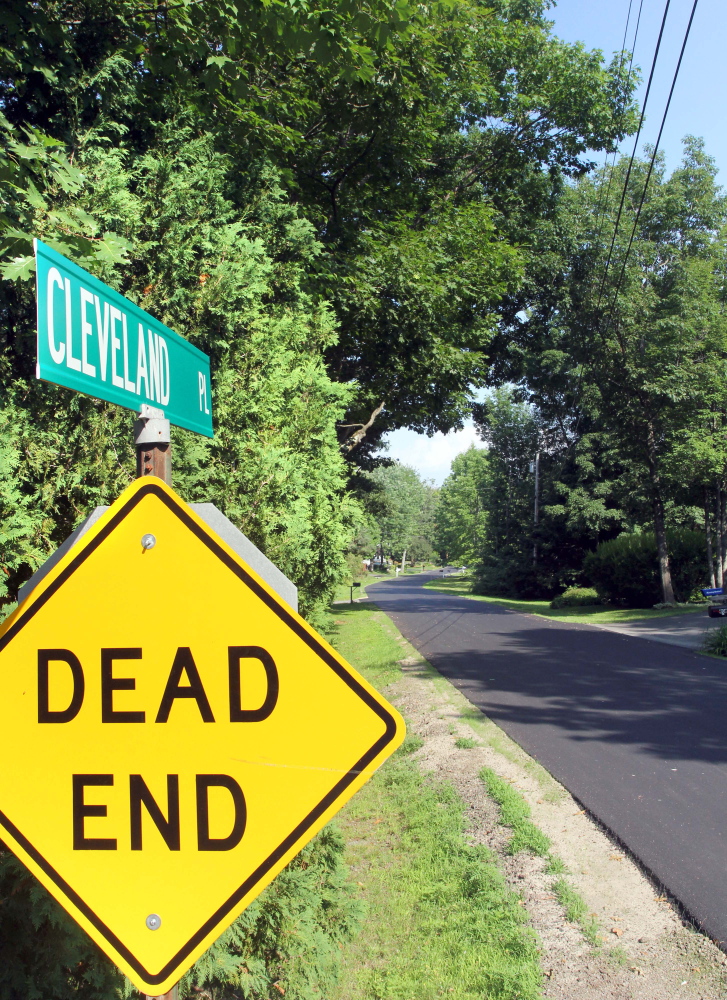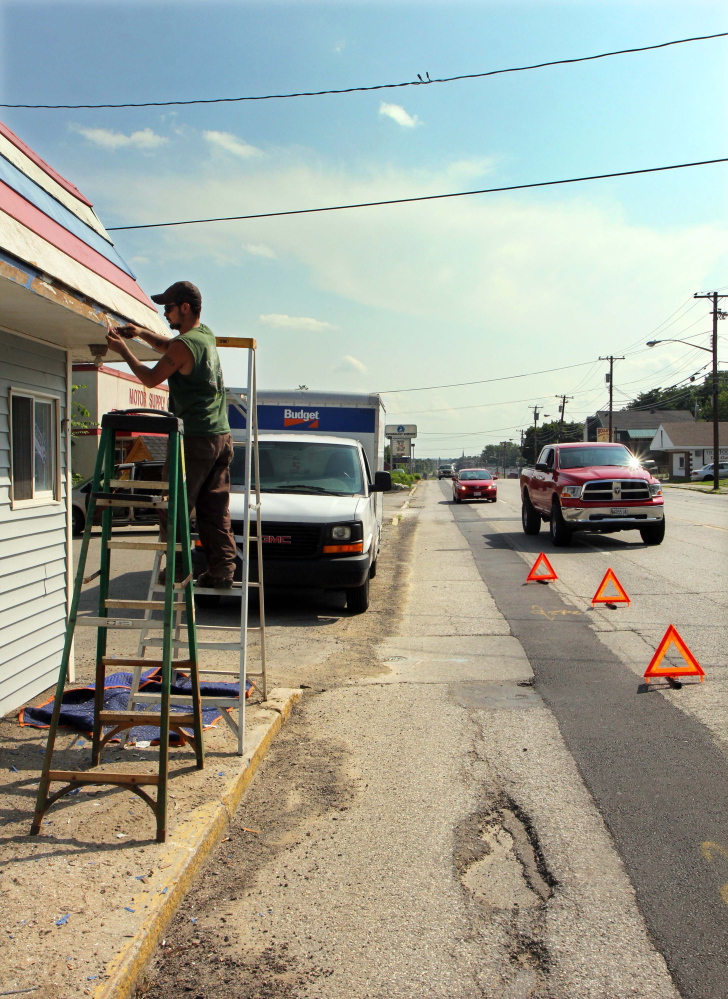WATERVILLE — Limited money and a lot of work needed means the city has to look closely at how to resurface decayed roads after the beating administered by a combination of heavy use and the freeze-and-thaw winter and spring.
Technical and financial factors play a big part in which roads get fixed first and which ones wait, as Waterville’s annual street paving program approaches mid-season.
“It’s a whole intricate system of finances and evaluation of the road conditions,” said Mark Turner, director of the city’s Public Works Department.
For instance, care must be taken so that a road due for underground utility work is not repaved before the work is done.
City councilors Tuesday night will consider awarding a $674,620 contract to a Windham company to pave just more than a mile of Drummond Avenue, from Armory Road to the Fairfield town line, as part of the city’s annual program to fix the roads most in need of repair.
The meeting will be at 7 p.m. in the council chambers on the third floor at The Center downtown.
The Drummond Avenue project is part of a Municipal Partnership Initiative Agreement between the city and state Department of Transportation. Drummond Avenue is a state-aid road, which means some state money is available for fixing the road.
The city will be responsible for $354,196 of the project and the money will come from a 2013 bond; the state will pay the rest. Councilors will consider awarding the $674,620 contract to All States Asphalt Inc. of Windham, the low bidder for the project. B&B Paving Inc. of Hermon bid $720,000; Pike Industries of Fairfield offered a bid of $823,660, according to Turner.
Previously, the city approved $15,196 for engineering costs for the project, putting the total cost at $715,196. Pine Tree Engineering, of Bath, did the engineering work.
As part of the Drummond Avenue project, drainage improvements will be made from where the Waterville Housing complex is located to about Greenwood Street, according to Turner. The Kennebec Water District is improving water mains near Armory Road and at the Fairfield end of Drummond Avenue. Those projects are expected to be completed within the next couple of weeks, he said.
“We should be able to move in rather quickly after that,” Turner said.
While the city will share the cost of the Drummond Street project with the state, Waterville earmarks additional money every year to fix the roads most in need of attention.
CITY MUST PAY
The city is spending about $1 million this year for paving projects, according to Turner, who says the city’s investments in roads over the past five or six years has been phenomenal.
“I think we’ve done some tremendous improvements, and we are looking toward continuing that in the future,” he said.
City Council Chairman Fred Stubbert, D-Ward 1, agrees with Turner but says a reduction in state funding for roads means delays in some needed road repairs. A lot of roads in the city are state roads and the city can not unilaterally do work on those roads, which are the state’s responsibility. The city has worked out deals on some roads where the city and state share costs; the city, state and Colby College shared costs, for instance, on paving the road through the college.
“I think we’re doing really well — (City Manager) Mike (Roy)’s done a great job and Mark (Turner)’s obviously done a good job,” Stubbert said Monday. “The roads are great compared to what they were 10 years ago. We’ve made a lot of progress.”
Some of the wear and tear on local roads is from visitors to the city, but the city bears the exclusive burden for maintaining those roads.
Stubbert said Waterville is a service center and its population doubles during the day when people come in to work, shop, eat at restaurants and take part in other activities. They also use the city’s police, fire and other services. Because the state defines a service center differently than the city does, the city does not get priority on road funding, according to Stubbert.
City road projects already completed over the spring and summer include those on Cleveland, Coolidge and Jefferson streets, as well as North Second Rangeway, behind Aubuchon Hardware off Kennedy Memorial Drive. Also, two newly accepted streets, Lupine Drive and Meadow Drive, off South Second Rangeway, have been paved; as have Greenwood, Wolf and Highwood streets, as well as Patricia Terrace.
The Park Street sidewalk and walkways in Veterans Memorial Park also were paved.
Cool Street will be paved this summer after gas line work is completed there, according to Turner.
“We’re hoping to have that underway by the end of this month,” he said. “The gas company (Summit Natural Gas) is working feverishly to get everything installed over there so we can proceed with the street upgrade.”
STATE HELP
The state will pave College Avenue, another state-aid road, from the Fairfield town line to Post Office Square downtown this summer, and that project will coincide with the Drummond Avenue project, he said.
“That’s (College Avenue project) supposed to start the first of September,” he said. “Folks heading south from Fairfield will encounter some delays due to construction.”
The state also will pave Upper Main Street, from Post Office Square, to the railroad tracks, he said.
A plan to improve the five-way intersection at Western and Chase avenues and First Rangeway is in the development design stage, according to Turner.
The city has a five-year road improvement plan and officials determine what roads will be improved based on a system of evaluation called the Road Surface Management System, according to Turner. Officials consider criteria including age, quality, depth and stress of pavement. The entire city is surveyed, priorities set and costs evaluated. If the city borrows money for road improvements, officials use that information in the borrowing process.
The installation of natural gas pipelines in certain areas of the city also will play a role in deciding what streets will be paved in the next few years, as the city will probably try to pave in those neighborhoods after pipes are installed, according to Turner.
Meanwhile, Summit Natural gas has been doing a good job, repaving areas of roads after installing pipes, he said.
“They’ve been keeping right up with it in view of the fact that it’s a large amount of installations,” he said. “They’ve been doing well, keeping them in place and working quickly to repave everything. They’ll go right through into December. Over the next few years, we’ll see this type of activity.”
Amy Calder — 861-9247
Twitter: @AmyCalder17
Send questions/comments to the editors.





Success. Please wait for the page to reload. If the page does not reload within 5 seconds, please refresh the page.
Enter your email and password to access comments.
Hi, to comment on stories you must . This profile is in addition to your subscription and website login.
Already have a commenting profile? .
Invalid username/password.
Please check your email to confirm and complete your registration.
Only subscribers are eligible to post comments. Please subscribe or login first for digital access. Here’s why.
Use the form below to reset your password. When you've submitted your account email, we will send an email with a reset code.